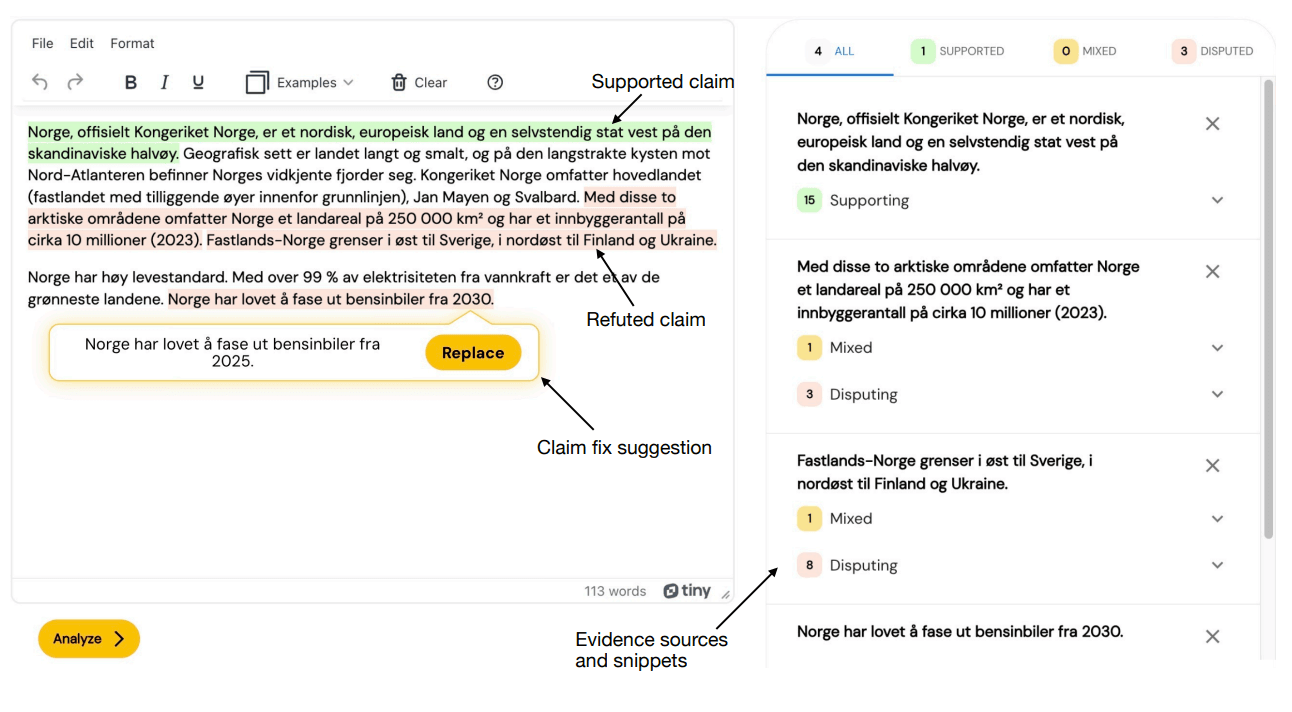Fact-checking in the age of AI: no longer just for newsrooms
18 Jul 2024
We talked to Gaute Kokkvoll – Head of Product at Factiverse, an AI-powered solution that shields businesses from AI-related risks. Originally designed for fact-checking in newsrooms, Factiverse now helps analysts, consultants, and journalists verify important textual information like news and reports. It aids in spotting risks quickly and navigating this changing landscape, ensuring users have reliable facts for success. Factiverse tackles challenges such as disinformation, digital trust, and the future of the Internet.
Autentika: Hi Gaute, good to meet you again! Can you tell us more about how Factiverse has evolved in the past year, and what strategies have you employed in refining your product to better suit market needs?
Gaute Kokkvoll: Sure! Initially, Factiverse targeted the media sector, but we've also seen significant traction from finance actors, compliance sectors, and chatbots. The Air Canada court case highlighted the importance of accurate chatbot responses; if they had used Factiverse, the error that led to their loss could have been avoided.
We're now discussing with several chatbot providers to integrate Factiverse as a credibility layer within their services. This partnership model would see us as a backbone for credibility, applicable to large language model training, text production, and content reading.
We have been focusing on new areas where our technology serves the most purpose. Our approach is evolving to power credibility and trust not only in newsrooms but also before content is generated, particularly with large language models. Ideally, these models should be pre-trained on credible data to prevent inaccuracies.
Also, we see the growing interest in AI agents, which require verification across multiple services and APIs, which opens up new opportunities for Factiverse.
Read also: The future of AI in sales: Insights from SMOC's CEO, Kristoffer Kvam
But you are still present in the media industry, helping journalists, aren’t you? How does Factiverse continue to support journalists in their fact-checking efforts?
Absolutely. One of our latest improvements is a live fact-checking service for political debates. Recently, a Danish fact-checking organization requested a solution, and within days, we developed a basic version. This setup includes live debate translation, claim detection, and real-time verification of what politicians say. Impressively, our system processes audio faster than video, allowing us to fact-check statements almost in real time.
We're gaining traction with partners in the Nordics, and with an upcoming super-election year, we're planning to launch Twitch streams for live fact-checking. And since this solution is also adaptable for podcasts, press releases, and other audio-visual content, marking a significant improvement in our offerings.
Can you explain how this technology works? Does it use an algorithm to classify sources as trustworthy and determine the correctness of claims based on that classification?
Our models operate in real-time and don't employ whitelists or blacklists. We don't pre-approve sources or blacklist others. Instead, when a claim is made, for example, about climate change, the model evaluates whether fact-checkers or other credible media have referenced the source in the past. This might give the source a higher value but doesn't automatically guarantee its credibility.
Recently, we conducted a project in Danish, achieving 95% accuracy, and the company involved noted that instead of needing six people to monitor debates, they could now manage with just one or two. This shows the potential of our solution – but the story does not end on transcription. Once debates are transcribed, we can perform interesting analyses and generate reports. For example, we could identify the most repeated false claims about immigration during EU debates across Europe.
This technology is beneficial for journalists and everyone. We envision it being used with any live stream or video file. Podcasters, for instance, often have assistants who find and fact-check sources. Our tool would be perfect for them to use in the background.

Source: Factiverse
Which other industries could benefit from such solutions?
I see great potential in banking and fintech services. We've observed that large language models often struggle with understanding numerical data. For example, these models can get confused when dealing with percentages, decimals, and currencies. In a recent white paper, we demonstrated that smaller, fine-tuned models could actually outperform leading large language models, particularly in tasks like detecting factual statements or fact-checking.
We have a significant research project with the University of Delft focused on enhancing the capacity to understand numerical claims and perform numerical fact-checking. For instance, if a financial assertion is made, we can break it down into smaller claims and questions, run them through our model, and provide a more context-based, nuanced reply regarding its truthfulness.
This capability has attracted interest from some of the largest banks in Norway. We have an upcoming partnership where we'll apply a similar process to fact-checking in media but tailored to proprietary or compliance data that these institutions prefer to keep private. These banks are looking for smaller, EU-based companies that comply with stricter regulations than US companies. This focus on compliance and data privacy has opened doors for us, allowing us to engage in meaningful discussions about grounding their outputs in compliance data, similar to structures in high-profile legal cases like the Air Canada court case.

What were your thoughts on ChatGPT-4o, particularly regarding its ability to respond to voice and handle video and audio files? Are there specific strengths you've observed and areas where you believe improvements are still needed?
GPT-4o still has limitations, particularly in real-time fact-checking and data search capabilities. Also, if you use GPT-4, you might only get one reference from Bing, as they're restricted in their search engine usage due to corporate structures. This limitation is where we have an advantage. We can adapt our technology more effectively for tasks like verification or fine-tuning for specific workflows.
Do you believe we can maintain objectivity in fact-checking? How do you address cognitive bias, considering that while facts are facts, subjective interpretations may arise?
I believe it's crucial to begin by acknowledging biases. However, with the emergence of new technologies, especially in their developmental stages, it's necessary to address how to effectively incorporate and manage these biases.
Take, for instance, the ongoing debates in Norway regarding violent crime rates, particularly among youths. Interpretations can vary significantly depending on the data sources and the demographic focus. This underscores the importance of emphasizing context over binary true/false classifications, especially in real-time fact-checking scenarios. Rather than simply labelling statements as true or false, our approach aims to provide nuanced assessments by presenting conflicting perspectives alongside supporting evidence.
By offering such nuanced insights, we empower users to evaluate the information presented critically. Moreover, considering the recent spotlight on AI safety and bias, navigating these issues effectively could be a significant competitive advantage.
What do you think are the main gains for organizations using AI-based fact-checking tools like Factiverse?
First, we provide users with a comprehensive overview from multiple sources. Typically, in gen AI Large Language Models, users might rely on one or two search engines, while with Factiverse, they can access perspectives from across the web.
Additionally, we prioritize those sources for clients integrating their own databases, such as internal archives or governmental sites, to tailor the search experience. This approach ensures that users receive the most relevant information for their line of work.
Finally, our platform seamlessly integrates into your workflow, much like Grammarly. You don't have to think about when to use it; it's always in the background, ready to assist you whenever needed. This approach ensures that users can seamlessly incorporate fact-checking and verification into their daily routines without ad hoc decisions or disruptions.
Thank you for sharing your insights, Gaute. Best of luck with further development!
Thank you!

Gaute Kokkvoll – Head of Product at Factiverse



